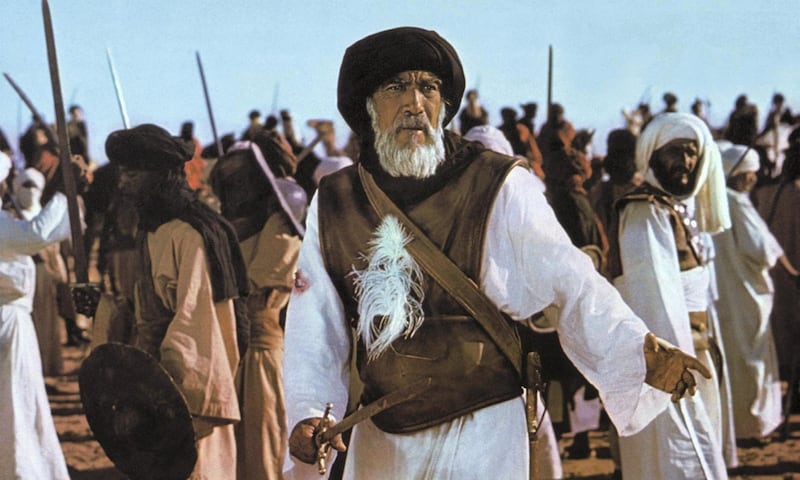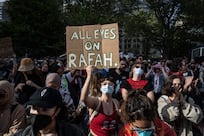In a darkened living room, my entire extended family had gathered. I was too young to remember exactly when this was but the scene is sometime in the late 1970s or early 1980s.
My father switched on the VHS player and inserted a video. The 19-inch television screen flickered into life and a grainy version of the film The Message appeared. It was the first ever cinematic production of the story of the Prophet Mohammed.
The film had a grandiose energy and a drama that reminded me of the snippets I had seen on TV of films like The Ten Commandments and Ben Hur.
I recognised the stories I had been told of the Prophet Mohammed and early Muslim history. I don’t remember much more of the film but it stuck in my mind. It offered something I had not seen on screen before – something that was positive and uplifting about my own story.
It was not until I was much older that I realised how extraordinary The Message was, both as a film and as a global moment when it was released in 1976.
Syrian-American producer Moustapha Akkad brought inspiration into cinema by bringing the film to our screens at a time when the public knew little about Islam.
The late Akkad is widely quoted about his motivation for producing the film. "I think there was something personal, being a Muslim myself who lived in the West; I felt that it was my obligation, my duty, to tell the truth about Islam," he said. “I thought I should tell the story that will bring this bridge, this gap to the West."
In a world where division, tensions and hatred are potent, the bridge across the gap is more needed than ever.
How groundbreaking the film was then – and how pioneering it continues to be. No other film on the subject of the Prophet Mohammed has been released since, despite announcements of some attempts.
To us now, in an era where Muslim stories and histories told with compassion, accuracy and positivity are more essential than ever, it seems extraordinary that it was vetoed by the Muslim World League.
The film could have been a massive global turning point. They rejected it on the grounds that the Prophet Mohammed and the people surrounding him, as well as incidental stories involving him, should not be depicted.
___________________________
Shelina Janmohamed is a weekly columnist for The National:
[ Women are disproportionately affected by mental health issues. It's time to talk about it. ]
[ Ramadan: a time of year to reflect, recalibrate and reconnect ]
___________________________
The genius of Akkad’s work is that the Prophet Mohammed is never shown and yet the prophetic presence is strong.
The film was funded by Kuwait, Morocco and Libya but the first two eventually pulled out. When it was eventually released in the US, opposition from the Hanafi Movement, a splinter group of the Nation of Islam, protested, which led to fatalities.
Fast forward 42 years and it seems the film is as timely, necessary and fresh as ever. Digitally remastered in 4K and due for re-release, I can't help but reflect on how much has changed since then – and yet how little.
Ignorance of the origins of Islam, its importance and interest to a huge swathe of the population still persists. If anything, it is now wilful ignorance laced, sometimes, with a certain hatred for the other.
On the other hand, the development of content is picking up pace. We have feature films like the story of Bilal. We have major drama productions about companions of the Prophet Mohammed and historical figures, to much acclaim. We will even have a Ms Marvel feature film with a Muslim female superhero soon.
Despite these glimmers, we know that resistance to films with positive Muslim storylines systemically persists.
Muslim characters – just like those of other heritages – play stereotypical and minor roles, usually terrorists, taxi drivers and jihadi wives. They are rarely the heroes; they are not the storyline. As audiences, their appetites and dollars are rarely considered motivating factors, despite the huge size and spend of the population.
Most of all, we continue to need great stories that speak to us and tell us something both of our history and our present. Whether you are Muslim or not, The Message delivers all of this and more.
I can’t wait to watch it with my children when it’s released, only this time it won’t be on a grainy TV screen but in all its cinematic glory. And I’m sure they’ll have equally strong memories of it.
Shelina Janmohamed is the author of Love in a Headscarf and Generation M: Young Muslims Changing the World





